|
Charis Around
the World
Childbirth in Kenya
by Jannekah
Guya
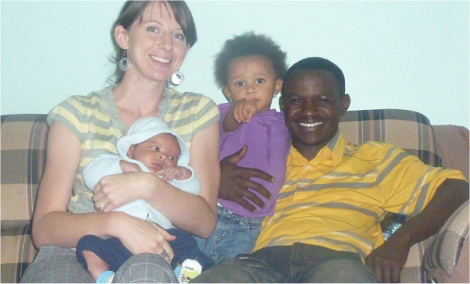
Jannekah
Guya and her blessed family
Jannekah
recently contacted Charis from her home in Kenya. She and her
husband are missionaries and praying about her continuing education
as she works in the birthing community to educate and help families.
Read on to look through Jannekah's "eyes" into the world of birth in Kenya,
and learn why she is a blessed future part of the Charis Family.
~ Susan Oshel |
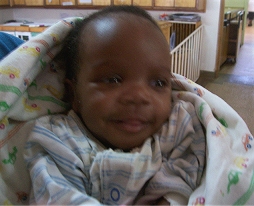 Baby
Alvisi was the happiest 4-week-old little girl I’ve ever seen in my
life. I didn’t know a baby as young and as tiny as her could smile
continuously and respond to any and all attention and love she could
get with a joy so pure. This precious, innocent little baby girl had
no way of understanding how very uncertain her future is. She wasn’t
yet feeling the pain and rejection of knowing that after giving
birth, her mother had slipped out of the hospital in the night and
in an instant left little Alvisi abandoned, orphaned, and alone in
the great big frightening world that had only just become her home. Baby
Alvisi was the happiest 4-week-old little girl I’ve ever seen in my
life. I didn’t know a baby as young and as tiny as her could smile
continuously and respond to any and all attention and love she could
get with a joy so pure. This precious, innocent little baby girl had
no way of understanding how very uncertain her future is. She wasn’t
yet feeling the pain and rejection of knowing that after giving
birth, her mother had slipped out of the hospital in the night and
in an instant left little Alvisi abandoned, orphaned, and alone in
the great big frightening world that had only just become her home.
I met little Alvisi right around Christmas time last year. My sister
and I were volunteering in the abandoned baby center in the biggest
hospital here in Eldoret, Kenya, where I live with my husband and our
two young children. Tragically, always around the holidays, the
numbers of abandoned babies skyrocket. At that time, Alvisi was one
of sixteen abandoned babies under six weeks old in that hospital
alone. All sixteen of these precious little ones were crammed into
two portacribs and were being cared for by three or four overwhelmed
staff members. One infant would cry, and someone would pick
her up,
change her, feed her, and lay her back in the portacrib so they could
do the same with another crying newborn. At night, when the staff
at the abandoned baby center go home, things become much, much
worse. The babies are left to the mercy of the nursing staff in the
hospital. Nurses in Kenya are notorious for lack of compassion, and
sometimes even cruelty. The babies are often left alone, crying all
night long and when they are many, sometimes they die because of
negligence. Yes, even in one of the biggest teaching hospitals in
the country.
All of these things are devastating to me, as I’m sure they are to
you. I began to pray and ask God what could be done to save these
innocent babies (Proverbs 31:8&9). He began to draw my attention to
the fact that I was looking for solutions to the problem that
already existed, but why were so many precious, beautiful little
babies being abandoned in the first place?
When you speak with any Kenyan woman about issues of pregnancy and
childbirth, a lot of emotions come to the surface, but not the kind
of emotions you might think. Instead of joy, excitement, curiosity,
and nervousness, every Kenyan woman I’ve ever talked to expresses
fear, terror, shame, and embarrassment. If you can find a woman who
is bold enough to share her birth story with you, it will most
likely be absolutely horrifying. There are very few educational
resources for young mothers, and those that exist are hard to find
and expensive. So, first time mothers are terrified by the fear of
the unknown and the horror stories they’ve heard from their friends. Multiparas are terrified because of their own previous horrific
experiences.
At the most vulnerable time of a woman’s life, and the life of her
baby for that matter, a Kenyan hospital is a terrifying,
intimidating, overwhelming place to be. The hospitals and clinics
are so over crowded it’s not uncommon for two laboring women to
share a tiny single bed. It’s not unheard of for women to give birth
on the hard cold floor. Husbands are not allowed to be with
their wives when they’re laboring or giving birth, and because of
cultural attitudes, refuse to be there even on the very rare
occasions that they are allowed. A worried and afraid sister,
cousin, friend or mother might come to the hospital, but usually
never gathers the courage (or gets the permission) to actually leave
the waiting area to be with the laboring mother. The mother usually
spends her labor alone and terrified, apart from the woman she may
be sharing a bed with of course, and the occasional nurse who might
poke her head in or rebuke the terrified woman for making too much
noise. A nurse will commonly slap a laboring mother or tell her to
shut up, and if the mother really displeases anyone on the nursing
staff, she’ll be purposely neglected as punishment. The concept of a
patient’s rights are humorous to medical staff, and though the
Kenyan constitution does provide for patient rights, in Kenya people
operate by the mentality that it’s not a law unless it’s enforced. The attitude is that doctors and nurses know all and the patient is
utterly ignorant of all things having to do with their own bodies. I
have a friend who went in for a routine prenatal exam and they told
her she was dehydrated and hooked her up to an IV. She was soon
feeling very strange and demanded to know what was in the IV. They
laughed off her demand, telling her it was no concern of hers. When
they were hooking her up to the second bag of fluids, she became
hysterical and insisted they tell her what was going on. Finally,
they admitted they were inducing her and she delivered her
five-pound baby boy five hours later.
When the mother is fully dilated and ready to push, the nurses call
the doctor who joins them and gives the mother a very large, routine
episiotomy as the nurses do everything in their power to speed
things along. They always apply crushing fundal pressure and often
tell the mother that the baby will die if she doesn’t hurry up and
push it out to try and make her go faster. And when it is all over,
the baby is whisked away and the mother is left emotionally and
physically exhausted and traumatized. Sometimes things don’t even go
that well.
Another friend of mine had her baby an hour after she arrived at the
hospital, before I could get there to be with her during the birth.
I arrived to find the nurses panicking because the placenta wasn’t
detaching. I asked if the mother could nurse the baby and maybe
squat and the nurses scornfully laughed at me and told me to wait in
the other room with the baby. Instead, they hooked her up to
something along the lines of pitocin and left the new mother to
suffer, contracting and bleeding alone for two more hours before
they finally called the doctor. The doctor came, gave her an
enormous episiodomy, reached all the way into her uterus and pulled
the placenta off and out with his hand. They then told her she
wouldn’t stop bleeding until she urinated and forced her to walk to
the bathroom, where of course, she collapsed and they had to carry
her back to bed. It’s estimated that 6,150 women die in Kenya every
year due to pregnancy and childbirth related causes. My guess is
that the number is much, much higher. Half of the women who die in
childbirth in Kenya die from bleeding to death.
I’m sharing all of this with you, not to paint a bad picture of
Kenya, this country I love so much. Because the reality is that
Kenya is a breathtakingly beautiful place full of beautiful people,
most of whom are creative, loving, Godly, hospitable, generous,
passionate, innovative, joyful, bright, kind, and so much more (Acts
10:34&35). But it is through these things that God began to reveal
to me why it might not be so far-fetched for a woman who struggles
in life and in fear through her pregnancy, and then has such a
traumatic birth experience, to have enough of an emotional lapse
with her new baby to consider leaving it behind. After all, the
struggle doesn’t end in the hospital for this woman. Maybe she has
six other hungry, unschooled children at home already. Maybe her
husband is a drunkard or maybe he’s abandoned her. Maybe, she has no
hope. Maybe she doesn’t know that a baby is a gift from Heaven. Maybe
she doesn’t know God has a plan. Maybe she doesn’t know that Jesus
can carry them through anything. Maybe if she knew, that would
change everything (Jeremiah 29:11).
Through this process of revelation, God did a work in my heart and I
knew I had to do something. Now that I knew and was beginning to
understand, I couldn’t sit idly by and leave the women and babies of
Kenya to suffer. The only resources I had were my own experiences
giving birth to my children, a couple books I had read during my
pregnancies, and the Lord. I began to openly talk with pregnant
Kenyan friends about pregnancy and birth. At first, they thought I
was absolutely crazy and delusional to describe birth as beautiful,
empowering, amazing, and wonderful. It may be the Kenyan belief
that white women have no pain in childbirth is true after all. But
as we talked more, they began to understand what birth is really
meant to be and the incredible way God designed our bodies to do
this miracle that we have the privilege and honor of being a part
of. I lent them my books and they began to feel safe talking with
me and asking questions. They began to believe, and hope began to
replace fear (1 John 4:18).
You see, in Kenya, pregnancy and birth are considered very, very
private topics, and it’s often considered taboo to talk openly about
them. Though it is considered one of the highest honors to be a
parent in Kenya, pregnancy is looked upon almost as a shameful thing,
and most Kenyan women do everything they can to hide their growing
bellies from everyone. When my husband and I found out we were
pregnant for the first time, we called his mother (who is a Kenyan)
to tell her the exciting news. She thought we were calling to say
I’d already given birth because it’s so unusual to talk about it
before the baby is born. This greatly adds to the tremendous fear
women have surrounding these issues. There is so much that is
unknown and misunderstood, and with no way to freely talk about it
and ask questions, the fear and misconceptions continue to grow.
Most Kenyan women don’t go for regular prenatal visits, and many
never go at all. But even if they do, it’s of no help to the
emotional turmoil they’re going through. The basic prenatal visit
consists of being weighed, blood pressure taken, maybe listening to
the baby’s heartbeat, and that’s about it. Most doctors are men, and
while they are often more compassionate than the few female doctors,
they are still men and it is culturally unnatural for a Kenyan woman
to talk about these “private” things with any man, even her own
husband. The husband’s part in all of this is usually simply to pay
the bill and pick her up from the hospital once she and the baby are
discharged. He’ll then take her home on the back of his bike, or
escort her to a rickety, bumpy, overcrowded public van, or they’ll
walk.
Many first-time mothers don’t even know what to do with the new baby
once they get him home, and if there is no older female relative
near-by to ask, the terrifying experience continues for the mother. One dear friend of mine rushed her new baby to the hospital the
first time the baby spit up because she thought it was a sign the
baby was deathly ill! Much more tragically, we know of a mother who
had trouble breastfeeding her new baby and after six days the baby
starved to death, or perhaps died of related causes. I was told of a
mother who just last month was force-feeding porridge to her
four-month-old baby, and the baby suffocated and died (Hosea 4:6).
So I began to imagine what a huge difference could be made just by
giving the little that I had (John 6:9). If I could be someone women
could finally trust to talk to and ask questions of, to pray with,
and most importantly, to be there when they were laboring, couldn’t
that radically change their birth experience, the way they thought
of themselves and ultimately what they thought of their babies? If I
were there for a mother emotionally, spiritually, and physically
through her pregnancy, birth, and even after she went home, if she
knew they could call me and I’d be there for her any time, wouldn’t
that make it much less likely for her to just sneak out of the
hospital at night, leaving her new baby behind, or for the baby to
die the first weeks and months of life outside the womb?
I was encouraged to look into doula training, and during a short
visit to the U.S., God provided through dear friends for me to attend
doula classes in Seattle, Washington, where I’m originally from.
Being better equipped, I am able to help pregnant, laboring, and
postpartum Kenyan women even more, but after encountering situations
like some of the ones mentioned above, I realized there is only so
much I can do to help and bring change with the limited knowledge
and credentials I have. So the next step in my journey was to
establish a relationship with some of the traditional birth
attendants I had only heard rumor of. The Kenyan government is
trying to “phase out” traditional birth attendants in the country so
that women give birth in the “safer,” “modern” hospitals, rather
than “risking their lives” to the ancient, “outdated” practice of
giving birth in a mud hut. To them, that is a step backward.
However, as you can imagine, many Kenyan women prefer traditional
birth attendants and feel safer with them. Besides the fact that
some women just live too far from the nearest health clinic, and some
simply can’t afford “modern medicine.” I have heard many stories of
women dying while their family begs the unsympathetic doctor to act,
but he refuses for lack of payment. Or of women giving birth on the
doorstep of the clinic because they didn’t have the money to pay. If
they are “lucky” enough to be treated without paying, they will
literally be held prisoner in the hospital until the full bill is
paid.
Every traditional birth attendant I’ve met has learned the art from
her mother or her grandmother. I’ve never met a birth attendant who
has completed any formal training or who has even finished the
equivalent of elementary school. However, women often feel much safer
with them than in the clinics and hospitals, despite the negative
stigma that surrounds traditional birth attendants. While it is
often truly a better birth experience for the mother and the baby
with a traditional birth attendant, there are still many dangers as
well. While the traditional birth attendant does not practice many
of the negative routines you’ll find in a Kenyan clinic, there is a
major lack of understanding in basic hygiene and sanitation. There
are also many false cultural beliefs and practices that can prove
harmful to the mother and/or baby. The AIDS epidemic also greatly
complicates the situation, as does the fact that traditional birth
attendants have very little knowledge or tools to handle an
emergency.
These issues deepened my conviction and resolve to do more, which
means I have to learn so much more. It is my desire to train to be a
midwife so that I can help Kenyan women have safe, beautiful,
fearless, dignified, empowering birth experiences. My ultimate dream
is one day to open a clinic and midwifery training center here in
Kenya. A place where young mothers can come and talk, learn, ask
questions, learn to help each other, and be empowered to work
together as women and mothers. A place where they can come for
counseling, prayer, education, and proper caring, compassionate,
safe health care. It is also my dream to make it a place where
traditional birth attendants can come to learn and see how they can
improve their own art. It’s impossible to go into a traditional
birth attendant’s mud hut and tell her what she should do
differently when her great-great grandmother did it this way and
she’s been doing it that way for twenty years herself. But if she
could come and see for herself ways that her work can produce even
better results, I truly believe it could make a positive difference. My hope is that we can have midwives from the U.S. and around the
world rotating on short-term missions to come teach the local Kenyan
midwives and mothers at the center, and in that way, everyone would
be learning from one another. I think that would please God and that
it would make a tremendous impact on everyone involved (Zephaniah
3:9).
But first things first. We can’t change the world until we change
ourselves, which means I need a lot of training and experience in
order to do what I believe God is calling me to do! My husband says,
God doesn’t call the qualified, He qualifies the called. After
knocking on a lot of doors, God finally led me to Charis, where I
met some amazing women who are just as excited about what God has in
store for Kenya as I am. We are praying that He’ll make a way for me
to be able to learn through their program as I work with and learn
from Kenyan doctors and traditional birth attendants locally. I’m
hoping and praying that this is the next step in my journey. In the
meantime, I’m reading every good material I can find on the subject
and trying to learn as much as I can as I wait on the Lord to make
the next step possible (Matthew 25:21).
Please join me in prayer for Kenya and her beautiful women and
children. God can use even us to make a difference if we just trust
Him. He uses the ordinary to do extraordinary things. That is His
delight.
“Brothers, think of what you were when you were called. Not many of
you were wise by human standards; not many were influential; not
many were of noble birth. But God chose the foolish things of the
world to shame the wise; God chose the weak things of the world to
shame the strong. He chose the lowly things of this world and the
despised things – and the things that are not – to nullify the
things that are, so that no one may boast before Him. It is because
of HIM that you are in Christ Jesus Who has become for us wisdom
from God – that is, our righteousness, holiness and redemption.” - 1
Corinthians 1:26-30
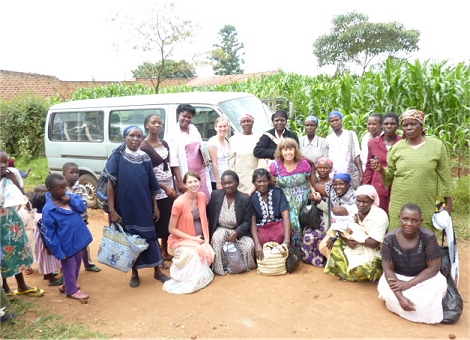
This is a group of traditional birth attendants gathered from
different villages
to be taught by the American midwife, Sherry Dress, who came to
Kenya to help Jannekah deliver her son this past June.
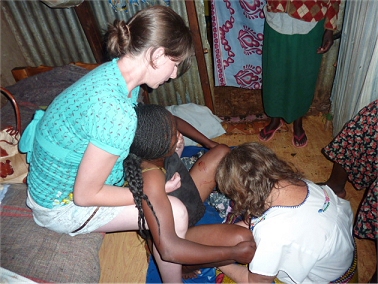
Sherry Dress and Jannekah helping a Kenyan woman give birth in a
birth attendant’s mud hut.
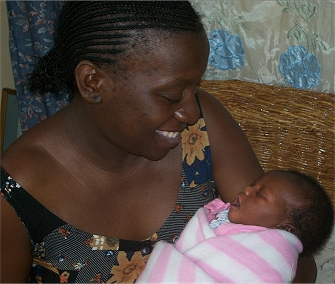
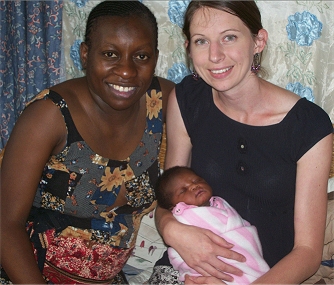
A Kenyan
woman and her baby Jannekah helped through pregnancy, labor, and
postpartum.
Very special to Jannekah as this was the very first woman she helped in
Kenya.
Dear
Charis Family,
The first time I talked with Jannekah, I sensed in her the “Charis
Heart”. She is truly a sister and I’m not sure I can even begin to
communicate my excitement in having her as part of our “family”. I
believe her vision has been birthed from the same part of Father
God’s heart as the Charis vision and I am convinced that our
connection is a divine appointment. As a result, I asked her to
share with all of you about her vision for improving childbearing
practices in her community.
I know that when God gives a person a vision for something, he also
provides everything needed to bring it to pass. If something that
she shared here has touched your heart, please consider helping her
in this great work she is doing. If you would like to help Jannekah,
who lives in a severely impoverished place, to cover her tuition,
please let us know. Any amount would be a great blessing. There is a
midwifery scholarship fund to help people like Jannekah get the
education they need so they can make a difference in their
communities. The fund is currently very small, but if we all give a
little, it will grow to the size needed to offer Jannekah either a
partial or full scholarship.
To give you an idea of how just a little bit can make a big
difference, I have broken it down for you:
If we raise $10,800.00, Jannekah will have a full scholarship for
her tuition. That seems big, but it is only 30 families giving
$10/month for the next 3 years… or 15 families giving $20/month. Or,
for those who wish to sponsor one month of Jannekah’s tuition, 36
families giving a one-time donation of $300 would completely cover
her tuition. Most Americans waste more money than that, even in this
suffering economy. I believe it is completely possible to raise the
funds! God is a GOOD Father and he cares deeply about the people of
Kenya! Spread the word to your friends who care about the world’s
women and babies! Perhaps your small group or church would like to
sponsor a month ($300) or a quarter ($900). Together we can help
improve the lives of precious Kenyan women and babies.
Thank you,
Kristin Schuchmann
Executive Director, Charis Childbirth, Inc.
To donate to Jannekah’s scholarship, make your check payable to
Charis Childbirth, include a separate note designating it for
Jannekah’s tuition, and send it to
Charis Childbirth, Inc.
P.O. Box 6900
North Port, FL 34290
Our International Charis
Family
Your stories from around the world touch us and we pray for your
safety.
Thanks, Love and Blessings to every one of you!

'Behold, I will bring them from the north country, And gather them
from the ends of the earth,
Among them the blind and the lame,
The woman with child and The one who labors with child, together,
A
great throng shall return there...And My people shall be satisfied with My goodness, says the LORD.'
Jeremiah 31:8, 14~~~
©2010 Charis Childbirth
Services, All Rights Reserved
Feel free to forward this newsletter to friends in its entirety,
leaving all attribution intact.
November 2010
|